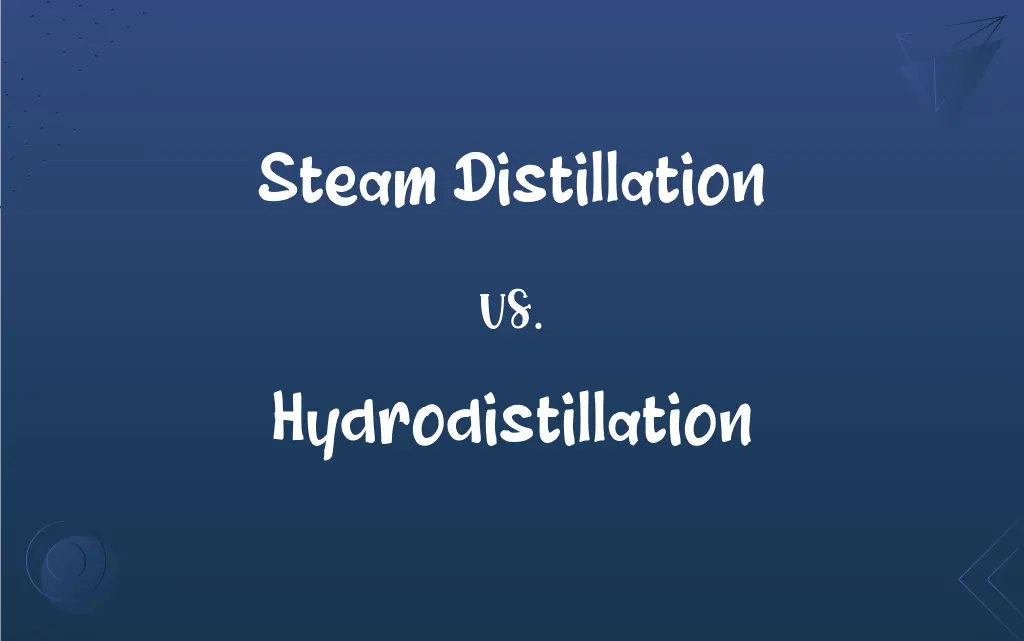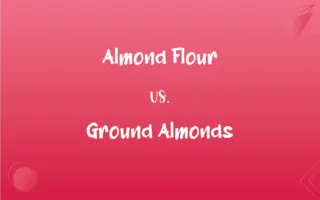Steam Distillation vs. Hydrodistillation: What's the Difference?
Edited by Harlon Moss || By Janet White || Published on January 20, 2024
Steam distillation involves vaporizing compounds using steam, while hydrodistillation involves boiling the plant material in water.

Key Differences
Steam distillation is a process where steam is passed through plant material, volatilizing the compounds, which are then condensed and collected. This method is particularly useful for extracting essential oils from plants without decomposing heat-sensitive compounds. In hydrodistillation, plant material is directly boiled in water, and the resultant steam containing the volatile compounds is condensed and collected. This method is simpler but may result in some decomposition of heat-sensitive compounds.
In steam distillation, the steam passes through the plant material, carrying with it the volatile compounds without saturating the plant. It allows for the extraction of compounds at temperatures lower than their boiling points, thus preserving the integrity of the compounds. Hydrodistillation, on the other hand, involves direct contact between water and the plant material, which can lead to the hydrolysis of some compounds, potentially altering their chemical properties.
The equipment used in steam distillation typically includes a steam generator, a distillation flask for the plant material, and a condenser. This setup allows for precise control over the temperature and the steam flow. Hydrodistillation equipment is generally simpler, often just a single vessel where the plant material is boiled with water, and a condenser for collecting the distillate.
Steam distillation is highly effective for extracting high-quality, pure essential oils, making it preferred in industries like perfumery and aromatherapy. Hydrodistillation, while not as efficient in preserving the purity of the oils, is often used for water-soluble compounds and is a more traditional method used in many cultures for essential oil extraction.
Efficiency is another differing factor. Steam distillation can process large quantities of plant material more efficiently and is better suited for industrial-scale operations. Hydrodistillation is more time-consuming and less efficient in terms of energy and resource usage, but it is more accessible for small-scale or traditional practices.
ADVERTISEMENT
Comparison Chart
Method
Passing steam through plant material
Boiling plant material in water
Temperature Control
Lower temperatures, preserves compounds
Higher temperatures, potential compound decomposition
Equipment Complexity
More complex, includes steam generator
Simpler, often a single vessel
Suitability
Ideal for volatile, heat-sensitive oils
Suitable for water-soluble compounds
Industrial Application
Preferred for high-quality essential oil extraction
Traditional, small-scale extraction
ADVERTISEMENT
Steam Distillation and Hydrodistillation Definitions
Steam Distillation
Involves extracting essential oils at lower than boiling temperatures.
Steam distillation preserves the delicate scents of rose petals.
Hydrodistillation
Involves direct contact between water and plant material.
Hydrodistillation can alter some compounds due to direct water contact.
Steam Distillation
Preferred for obtaining pure, high-quality essential oils.
The perfumery industry relies heavily on steam distillation.
Hydrodistillation
Simpler setup, often involving a single distillation vessel.
They used a basic hydrodistillation unit for their small herbal business.
Steam Distillation
Utilizes a steam generator for the distillation process.
They set up the steam distillation apparatus for extracting peppermint oil.
Hydrodistillation
Suitable for water-soluble compounds and traditional extractions.
Traditional medicine practitioners often prefer hydrodistillation.
Steam Distillation
Efficient for industrial-scale essential oil extraction.
Their facility used steam distillation for large-scale production of citrus oils.
Hydrodistillation
Less efficient for large-scale operations, used in small-scale practices.
For their home-based project, they chose hydrodistillation.
Steam Distillation
A process using steam to volatilize compounds from plant material.
Lavender oil is often extracted using steam distillation.
Hydrodistillation
A method where plant material is boiled in water to extract compounds.
Hydrodistillation was used to extract oil from the rosemary.
Hydrodistillation
A variant of steam distillation in which material is soaked for some time in water after which the mixture is heated and volatile materials are carried away in the steam, condensed and separated
FAQs
What type of compounds is steam distillation best for?
Volatile, heat-sensitive compounds.
Does steam distillation use high temperatures?
No, it operates at lower temperatures.
Can hydrodistillation decompose compounds?
Yes, due to direct contact with hot water.
Is hydrodistillation suitable for water-soluble compounds?
Yes, it's effective for such compounds.
What is steam distillation primarily used for?
Extracting essential oils from plants.
How does hydrodistillation work?
By boiling plant material in water to extract compounds.
Can hydrodistillation be used for large-scale production?
It's less efficient for large-scale operations.
What industries use steam distillation?
Perfumery and aromatherapy industries.
Is hydrodistillation energy efficient?
It's less energy-efficient than steam distillation.
Does steam distillation require complex equipment?
Relatively more complex than hydrodistillation.
Is hydrodistillation good for all types of plant materials?
It's versatile but may not preserve all oil qualities.
How does steam distillation affect the quality of oils?
It preserves the quality and purity of oils.
Are there specific plants best suited for steam distillation?
Plants with volatile and delicate oils, like lavender.
Is hydrodistillation used in traditional practices?
Yes, it's common in traditional extraction methods.
Can steam distillation extract large quantities?
Yes, it's efficient for large-scale extractions.
Can hydrodistillation alter the chemical properties of oils?
Yes, due to potential hydrolysis.
What's the main advantage of steam distillation?
It preserves the integrity of delicate essential oils.
Does hydrodistillation require a steam generator?
No, it typically uses a single vessel.
Does steam distillation require temperature control?
Yes, precise temperature control is important.
Can hydrodistillation be done at home?
Yes, it's simpler and can be done with basic equipment.
About Author
Written by
Janet WhiteJanet White has been an esteemed writer and blogger for Difference Wiki. Holding a Master's degree in Science and Medical Journalism from the prestigious Boston University, she has consistently demonstrated her expertise and passion for her field. When she's not immersed in her work, Janet relishes her time exercising, delving into a good book, and cherishing moments with friends and family.
Edited by
Harlon MossHarlon is a seasoned quality moderator and accomplished content writer for Difference Wiki. An alumnus of the prestigious University of California, he earned his degree in Computer Science. Leveraging his academic background, Harlon brings a meticulous and informed perspective to his work, ensuring content accuracy and excellence.






































































